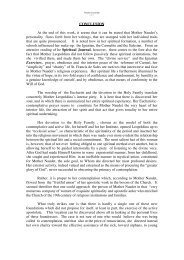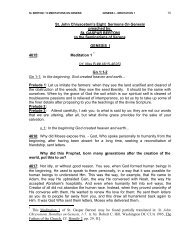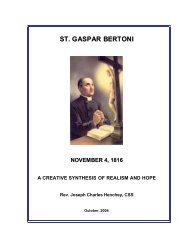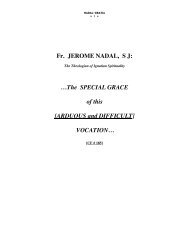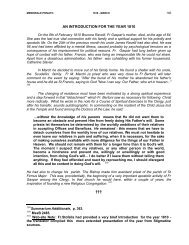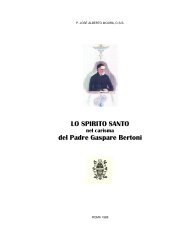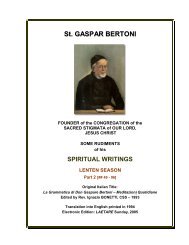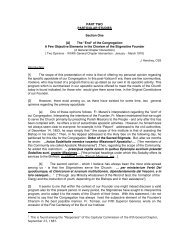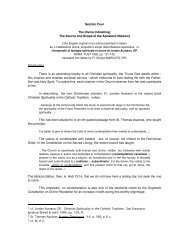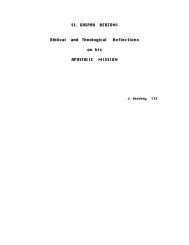[B.] St. IGNATIUS of LOYOLA Presentation: The ... - St. Gaspar Bertoni
[B.] St. IGNATIUS of LOYOLA Presentation: The ... - St. Gaspar Bertoni
[B.] St. IGNATIUS of LOYOLA Presentation: The ... - St. Gaspar Bertoni
You also want an ePaper? Increase the reach of your titles
YUMPU automatically turns print PDFs into web optimized ePapers that Google loves.
INTEGRE;SJ-OFM<br />
= 49 =<br />
portrait <strong>of</strong> this great virtue. It seemed that she was a pure spirit, without the weight <strong>of</strong> humanity.<br />
And with her example, she manifested the will to have and to maintain this virtue.<br />
2147: Obedience: and not only <strong>of</strong> execution and <strong>of</strong> deed, but also that <strong>of</strong> will and judgment. If it<br />
had been possible for her, she would not have wanted to take a step, nor draw a breath, without<br />
the merit <strong>of</strong> obedience. Invited by the Most Holy Virgin to the eternal banquet, she excused<br />
herself in that she did not feel she had this under obedience. And when commanded by Christ,<br />
and reproved because <strong>of</strong> her fasting, she never wanted to do any <strong>of</strong> this unless under obedience.<br />
Even in the harshest <strong>of</strong> her trials that came to her from other human beings and from the devil,<br />
she begged her Superiors never to use terms <strong>of</strong> what would be better, but only those <strong>of</strong><br />
commanding and ordering.<br />
[d. In Fear and Hope in the Cross]<br />
2148: In such sublime virtue, she never fell prey to pride: rather, she always considered herself<br />
to be the greatest sinner, and not only in her opinions and words, but in deed.<br />
I know that the fear <strong>of</strong> the Lord is the beginning <strong>of</strong>, and is wisdom itself Si 1:16.<br />
This must be maintained in charity which is perfect, which is also the sign <strong>of</strong> its authenticity: Fear<br />
the Lord, all you his saints. Ps 33:10.<br />
However, since charity is known by deeds: If anyone love me, he will keep my word,<br />
and my Father will love him. And we will come to him, and will make our abode with him,<br />
etc. Jn 14:23 - then all the more is it manifested in suffering . <strong>The</strong> reason is that the pro<strong>of</strong> <strong>of</strong> love<br />
is the manifestation <strong>of</strong> the work, and sufferings show charity radicated and solid in the heart:<br />
But that on the good ground are they who are in a good and perfect heart, hearing the<br />
word <strong>of</strong> God they keep it and bring forth fruit in patience. [Lk 8:15.<br />
2149: However, the Apostle Paul does not simply concede, but praises taking glory in the<br />
hope <strong>of</strong> glory for the sons <strong>of</strong> God: Being justified therefore by faith, let us have peace with<br />
God, through our Lord Jesus Christ, by whom we also have access through faith into this<br />
grace wherein we stand, and glory in the hope <strong>of</strong> the glory <strong>of</strong> the sons <strong>of</strong> God. Rm 5:1, ff..<br />
He then adds, almost this new grade <strong>of</strong> perfection to this good glory: And not only so: but we<br />
glory also in tribulations. Rm 5:3.<br />
Now Veronica did not end by glorying in the hope <strong>of</strong> the glory <strong>of</strong> the children <strong>of</strong> God,<br />
with the ordinary level <strong>of</strong> being just: justified, yes, but with the grade <strong>of</strong> the more perfect just and<br />
with the greatest saints she came to glory in suffering: but I will glory in tribulations, Rm 5:1, ff.<br />
She indeed glory in suffering: in the Cross, as can be gleaned from her love <strong>of</strong> penance,<br />
mortification, fasting, all <strong>of</strong> which were her Cross [cf. Book 3, chapters 4 & 5].<br />
[e.<br />
Penance Lived]<br />
2150: Mortification: she practiced heroic acts to overcome her repugnance <strong>of</strong> her very delicate<br />
nature: she had putrid fish brought into her room, [etc. 60]; she kept a cotton pad used to<br />
bandage an external ulcer from the infirmary mistress, which she chewed over in her room. As<br />
these acts displeased the devil, she noted that the kitchen utensils she was using were all<br />
mysteriously over-turned. Yet, her efforts were pleasing to God, and that it was seen that the food<br />
she was preparing was more mysteriously multiplied. <strong>The</strong> challenges in the novices’ training she<br />
took on herself [62, etc.], even taking care <strong>of</strong> their corporal needs in sickness [63]. Her room<br />
seemed to harbor all the insects <strong>of</strong> the entire monastery, [ibi]. She would eat for herself even the<br />
longest kept left-overs. [212].<br />
Fasting: the life <strong>of</strong> the Capuchin Nuns in that Convent was a perpetual abstinence from<br />
meat, and the fast was maintained every day, except for Sundays. With what she ordinarily ate<br />
she could not naturally keep alive, in the judgment <strong>of</strong> her doctor. <strong>The</strong> devil rendered this all the<br />
more bothersome with all kinds <strong>of</strong> creatures, such as insects, mice, bed-bugs, blood-suckers; the


![[B.] St. IGNATIUS of LOYOLA Presentation: The ... - St. Gaspar Bertoni](https://img.yumpu.com/33393889/49/500x640/b-st-ignatius-of-loyola-presentation-the-st-gaspar-bertoni.jpg)
